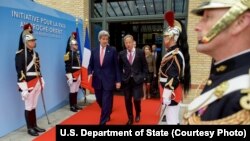U.S. Secretary of State John Kerry said Saturday "constructive" ideas are needed to find a solution to the Israel-Palestinian conflict.
Kerry spoke after meeting in Paris with French Foreign Minister Jean-Marc Ayrault and before the top American diplomat's departure for Mongolia.
Kerry has been in the French capital with ministers from more than 20 countries who accepted France’s offer to coordinate and work on the prospect of convening an international conference by the end of the year designed to come up with a solution for the ongoing conflict.
Neither Israel nor the Palestinians attended the Paris meeting.
On Friday, Kerry said both Israel and the Palestinians need to take immediate steps to demonstrate the will toward a lasting peace.
“We need to find some immediate kinds of steps on the ground that will make a difference,“ Kerry told reporters. “Everybody agreed today that you can’t impose a solution from outside and you need to have direct negotiations."
"A negotiated, two-state solution is the only way to achieve an enduring peace, with two states, Israel and Palestine, living side by side in peace and security," conference participants said in a joint communique.
Status quo
Participants underscored that the status quo is not sustainable.
"Actions on the ground, in particular continued acts of violence and ongoing settlement activity, are dangerously imperiling the prospects for a two-state solution," the communique said.
Participants discussed possible ways in which the international community could help advance the prospects for peace, including by providing meaningful incentives to the parties to make peace and end the Israeli occupation that began in 1967.
Hollande approach
French President Francois Hollande called on Israelis and Palestinians to "make the courageous choice of peace," as he opened the peace conference Friday.
"The discussion on the conditions of a lasting agreement between Israelis and Palestinians must take into account the whole of the region," Hollande said.
Hollande went on to say international powers should play a key role in facilitating the peace process, but ultimately it would be up to the two sides to work out their differences.
"The threats and priorities have changed. The changes make it even more urgent to find a solution to the conflict, and this regional upheaval creates new obligations for peace," he said.
"We're not here to propose any kind of specific agenda," a senior U.S. State Department official said. "While the U.S. is open-minded about ideas, we haven't made any decisions about what, if any, our role would be in that initiative going forward."
Despite the recent escalation in violence between Israelis and Palestinians and their absence at the conference, there is a glimmer of hope on the horizon with the swearing in Monday of ultranationalist Israeli Defense Minister Avigdor Lieberman, who said he supports a two-state solution.






